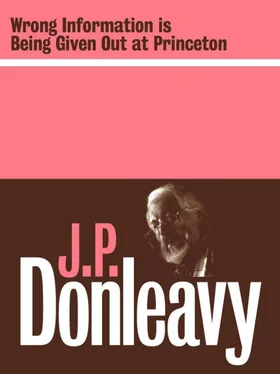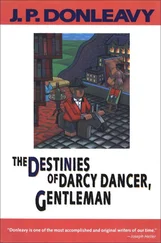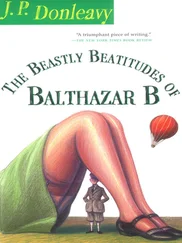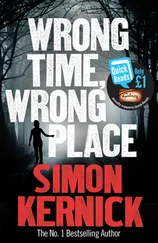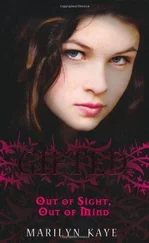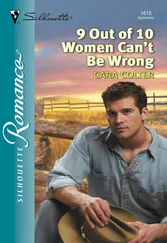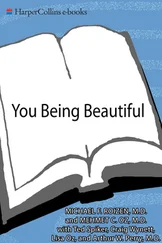Mourners retreating. Ertha stared at me and then as I stared back, she looked away. One wants to say, What the fiick else did you do to Max, you bitch. Mourners reaching the roadway. Limousine doors opening and shutting. More snow falling. A blue jay squawking nearby in a tree. Dru in her black splendor accepting last condolences from relatives, staff, acquaintances. Making me feel as if I were some sort of trespasser. After someone for their money. Which is after all, the greatest tribute they can be paid. And now she’s gone her way. And I’m gone mine. Walking down the gentle slope of this hill whitening in snow. As a figure sidles up. What more must I hear if I listen. The voice is asking would I chat with him at his office on the seventeenth floor of the Triumphington building on Madison Avenue at a time convenient. And now good God, a tap on my shoulder. What next. Another voice comes near as I turn. And this from a famous face in magazines and newspapers.
“I am so sorry and I apologize for intruding upon you at a time like this but I had, having only recently been able to meet with your wife Sylvia, been unable to reach you by telephone. I just wanted you to know that she gave me the score of your minuet sometime ago and which I regard as such a brilliant work of composition that I took the liberty of rehearsing it with my symphony orchestra. Might I just ask at this time if you would consider its being performed. Please telephone my office. I should like to invite you more formally to conduct its premier performance. I’ll say no more except that Sylvia was one of the most brilliant and wonderful dancers, and she was too, such a princely girl. Again, please accept my most sincere condolences.”
Dark pointed shoes of this famed conductor and composer who did not show up for our appointment when I was previously to meet him. Was the news of this event all over the newspapers. To bring him here in all his finery. Yet so courteous and pleasantly glittery-eyed, bracelets on his wrists. Amazing how when you meet people and they tell you something you want to hear, it transforms them from someone previously objectionable at a distance into someone delightful close-up. And even utterly charming and compassionate. But at least one thing is for sure. My name O’Kelly’O is going to go carved on a piece of marble over a grave dug near a socially registered Protestant mausoleum in one of the best cemeteries. And I’ve got to say again that when the chips were down, Jonathan Witherspoon Triumphington III, IV, or whatever he was, had plenty of guts after all. And some of Dru’s words — or were they Sylvia’s — come back to ring in my ears. “There will be one day in your life when you need not worry about the mundane anymore.”
Workman at the pile of soil shoveling it into the grave. And then a figure in a tattered-looking brown coat who’d been lurking back at the side of the gray granite mausoleum, was coming down the little hill to walk away on the road. And from the corner of my eye I saw just a flash of the face seen before behind a screen door in Syracuse. And I knew even now, cloaked with its veil, it was Sylvia’s never-forgotten mother.
Dropped off on Pell Street, the heavy car door clunking closed, I hated to leave the warm secure comfort. Like being shoved out again into the cold world. And without even showing signs of wanting a tip, the chauffeur saluting me, and I realized he did so with a certain lack of precision distinctly naval. And I saluted back. Went into the hall, up these dusty stairs and back into the apartment. In an effort to prevent mess accumulating further in these shabby rooms I pulled out a drawer to place my clothes away. And there in the back corner of this depository was the sweater Sylvia wore when I first met her. The heavy wool folded on top of a pair of her black leotards. Gently, reverently, I lifted them up. There under the sweater was a brand-new twenty-dollar bill. Like the kind she used to give me for car fare. And a note.
Maestro, who knows, you may need this.
And the sob came up as if from the bottom of my feet and from the end of my toes. Unstoppable. Racking every part of my body. And clinging to myself I lay on the bed, my tears soaking the pillow. And next I knew, it was dawn and a pigeon standing in the snow outside on the windowsill.
I knew somehow that I had to get up out of this whirlpool of sorrow or be forever sucked down to no one’s good. And get out into life again. I was sure I was being followed as I went to my familiar Bowery bar to call the Hotel Pennsylvania to ask Amy when I could take her, as I had promised, on a ride on the Staten Island Ferry which let you escape to a brief freedom and return with renewed confidence to New York. Remind myself again. That a nickel a head and a dime round-trip, it was something left I could afford to do in New York. And knowing the ferry was one of America’s most incredible clubs, where each commuter could recognize a stranger and every other commuter’s face and where they sat and what they read. But Amy was again out.
And so important now that I knew it was, to break the barren hold of all these buildings. To vigorously walk the rest of the streets right down to the tip of Manhattan Island. And past where in a twenty-five-cent lodging house Stephen Foster once lived. And who died abandoned and penniless in this city after creating such wonderful music and song.
At last at the end of Broadway the open park ahead, it was as if a whole new world was starting all over again after one had died and woke up living. Yet knowing one lost someone I must have loved. And the one who in death had saved my life. So that I and my music could live.
Remember again. It was my own decent hardworking parents who, even though they weren’t invited to the wedding and with their own dire worries to think about, gave Sylvia and me a few hundred bucks as a present, and we were just able to afford to take the apartment with the big windows looking down on Pell Street. But they said I was moving back into a world that they had struggled to get out of all their lives. And it is true. Even as I go now, I feel disgust at the lack of human dignity along the Bowery streets. The pawnshops, bars and flophouses. A distinguished gray-haired gentleman who could have been my own father accosting me, begging. Asking him, “What has befallen you, friend.” No answer. And I gave what coins I could. And now I know how the rich of the richest live. They have, while they’re awake, appointments. And yet in these United States we live in, for many it was all falling asunder. Where once-respectable, dutiful, God-fearing people end up strewn in the gutter.
Trotted across the rest of the park on this very tip of Manhattan Island. The whistle blew. A Staten Island Ferry about to leave. Up the steps. Run. Run. Jump past as the gatekeeper closes the gates. The last passenger getting on board. Ferry pulling out, squealing against the greased great pilings. Go buy a hot dog adorned with bowel-moving sauerkraut, relish and mustard. Go out on deck. Eat it in the breeze. Stare out at this massive statue holding up its torch of liberty. Emblem of this city and America. Vessels anchored in the bay. Try to read the flags they fly. The wind beating upon the cold gray choppy waters. A tugboat plowing through the waves, foam up over its bow. Draw in a breath of chill air. Turn to go back into the warmth. Stop. And there she is, leaning on the railing. In a black beret, her blond hair being blown back by the wind over her shoulders. The delicate whiteness of that face. Amy from Knoxville. And I could hear Max’s voice saying, How modern can life get, pal, how fast, and how surprising, to be even a bigger pain in the ass. And he also said, Amy was from a good family. That he had holed up with her without repercussions. And what a gal.
Читать дальше
